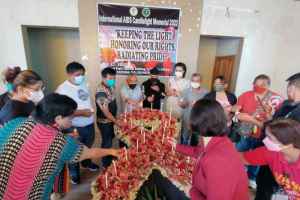FUTURE OF SMALL-SCALE MINING UNDER BBM ADMINISTRATION SEEN
“PH small-scale mining groups assembly set in Baguio.”
BAGUIO CITY – The 350kstrong pocket miners all over the country are hoping government policies on the Small-Scale Mining Program will be hastened for the latter’s survival under the incoming administration of President-elect Ferdinand “Bong Bong” Marcos, Jr.
Leaders and members of small-scale mining groups across the country are expected to present their solid position on small-scale mining to President-elect Marcos when the latter meets in Baguio for their national assembly, starting July 27.
The national coalition of small-scale miners will discuss issues and problems confronting their group, come up with action plans, and seek government support for the industry.
Topping issues to be discussed include- lifting the stoppage order on small-scale mining, application, and processing of Minahang Bayan (MB) and processing of small-scale mining contracts (SSMCs), and protection of the environment towards responsible mining.
Also, the group will sustain its position in pushing amendments to some provisions of Republic ” Act 7076 otherwise known as “People’s Small-Scale Mining Act of 1991,” and provisions of the Implementing Rule and Regulations (IRR) of the said law—especially the “excessive” capitalization.
Section 10 (Art III) Application to Enter into a Small-Scale Mining Contract (SSMC) states:” The authorized capitalization for an application for SSMC shall be P10-Million with a minimum paid-up capital of P625,000.
Earlier, pocket miners in Benguet complained about the “excessive” capitalization provisions of the IRR and joined other groups of SSM across the country in urging the government to amend some provisions of the law.
Another issue to be tackled– “consent” by indigenous people (IPs) and large mining companies before small-scale mining activities.
In an exclusive interview, Leoncio Na-oy, incoming secretary-general of Benguet Federation of Small-Scale Miners, Inc. (BFSSMI) said, their federation will be hosting the two-activity of the Philippine Coalition of Small-Scale Miners (PCSSM), composed of 250K-strong pocket miners all over the country.
The coalition will also solidify its stand to re-classify small-scale mining. BFSSM, whose members numbering to 15k is an affiliate member of the PCSSM, the umbrella group of small-scale miners in the country.
In a published report by Philippine Institute for Development Studies (PIDS) -April 2020 –“Answering critical questions on small-scale mining in the Philippines” authored by Ludwig John Pascual, Sonny Domingo, and Arvie Joy Manejar states:
“The small-scale mining sector was earlier seen as a platform for employment and economic opportunities in the Philippines. Sadly, despite the passage of the Small-scale Mining Act of 1991 and the implementation of the People’s Small-scale Mining Program, persistent poverty levels… and informal and child labor have persisted in the communities hosting small-scale mining activities.”
“To date, there are no documented reports of the small-scale mining’s contribution to the progress of the
country.”
Small-scale mining was first acknowledged as a formal industry sector in 1984 (PD 1899).
Six years later, the Small-scale Mining Act of 1991 was enacted, introducing the People Scale-scale Mining Program,
transferring the authority over scale mining to provincial or city mining regulatory boards, chaired by the regional director of Mines and Geosciences Bureau (MGB).
Central to the law (People’s Small-scale Mining Program) is the condition that all small-scale mining activities must be done within the declared people’s small-scale mining area or Minahang Bayan.
“However, the majority of small-scale miners found it very difficult to comply with this condition…As there were two laws governing small-scale mining, confusion and social concerns also deepened within small-scale mining activities,” the study states.
Last month, in a mining forum, lawyer Wilfredo Moncano, MGB director reported that there are 14 MB approved in the Cordilleras.
Still on minahang bayan- in terms of requirements, the PDIS study found that it “very prohibitive for SSM to comply with—feasibility studies, work programs, and environmental impact analysis are likewise too technical and expensive to complete.
The study further states:” Current conditions set by Bangko Sentral ng Pilipinas (BSP), the agency designated by law to procure all gold produced by duly licensed/registered small-scale miners, are not conducive to attracting small-scale miners.”
Several officials of LGUs and officials of government line agencies “admitted” that the selling of gold produced is done in “black markets” attracted by high buying by gold traders.
These conditions include paperwork, early afternoon cut-off, payment in checks, and processing fees, among others.
Primo Agatep/ABN
Headlines
22 MOTORISTA NAHULI SA OVERSPEEDING SA BAGUIO
June 21, 2025
BACK TO SCHOOL
June 21, 2025
GUICO STARTS CAPITOL COMPLEX FLOOD CONTROL PROJECT REHAB
June 21, 2025






